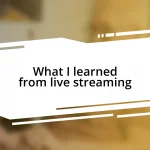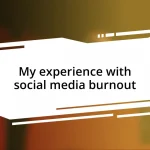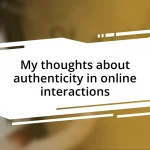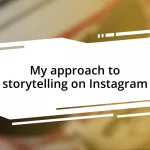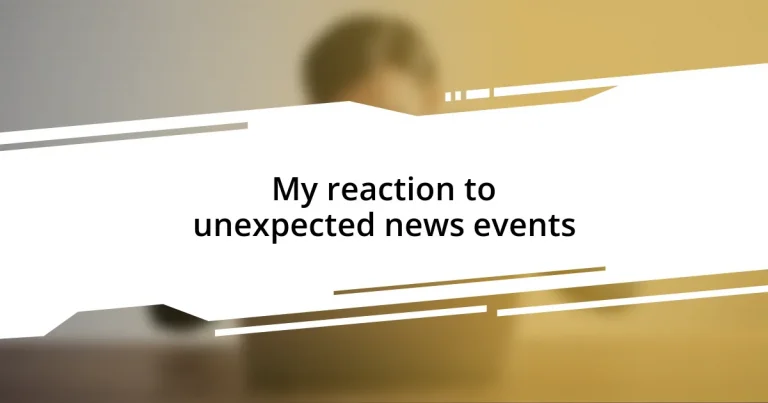Key takeaways:
- Unexpected news can disrupt our sense of stability, prompting emotional reactions like anxiety, confusion, and relief.
- Finding a support system and engaging in discussions can alleviate feelings of isolation and foster resilience in challenging times.
- Techniques such as journaling and taking a moment to breathe can help process chaotic emotions and create clarity.
- Adopting a growth mindset and practicing self-compassion are essential for building resilience against future unexpected events.

Understanding unexpected news events
Unexpected news events can shake our foundations in ways that we often underestimate. I vividly recall the moment I received news about a friend’s sudden illness—it felt as if the ground shifted beneath me. Have you ever experienced that gut-wrenching feeling when your reality suddenly changes?
These events force us to confront our assumptions and emotions head-on, revealing just how fragile our sense of stability can be. When I heard about a local natural disaster, I was initially filled with disbelief, struggling to absorb the magnitude of what was happening. How can we process our feelings in the midst of chaos, and what do we need to navigate through these turbulent emotional waters?
Moreover, reacting to unexpected news is not just about the event itself; it’s about our personal connections and the ripple effects that follow. I remember discussing such news with family and friends, sharing our fears and hopes, which somehow eased the burden. How do you cope when life throws a surprise your way? Finding a support system can often transform a distressing experience into a shared journey of resilience and hope.

The psychology of surprise reactions
Surprise reactions tap into some profound aspects of our psychology. When I got the sudden news of a family member losing their job, I felt an immediate rush of anxiety. It’s fascinating how our brains process such jolting information—often triggering a fight-or-flight response before we even fully understand what’s happening. This instinctual reaction can lead us to feel overwhelmed or even paralyzed, making it difficult to think clearly in the moment.
- Emotional Displacement: We might find ourselves reacting with anger or denial, which masks deeper feelings like fear or sadness.
- Cognitive Dissonance: Unexpected news often conflicts with our established beliefs, causing mental discomfort as we try to reconcile what we thought we knew with the new reality.
- Need for Support: Sharing surprising news can help alleviate feelings of isolation, as I learned during a shocking political announcement that left many disheartened; discussing it with friends grounded my emotions.
- Adaptive Resilience: In time, individuals can adapt to unexpected news, sometimes finding new strength in what initially seemed devastating.

Common emotional responses to news
We often have strong emotional reactions when we encounter unexpected news. I remember receiving an unexpected message about a major change in our community’s leadership. My immediate response was a mix of confusion and concern—they formed a knot in my stomach that lingered far longer than I anticipated. This common experience showcases how surprise can elicit anxiety, making us question the implications for our future.
The surprise news we absorb also tends to provoke a spectrum of feelings. There was a time when I learned about a close friend’s unexpected breakup. I felt a deep sense of sorrow for them, but also a strange sense of relief on my own behalf. This duality illustrates how our emotional landscape can shift based on how we relate to the event, often leading to feelings of guilt or relief layered on top of sadness.
In addition to confusion and anxiety, feelings of hope can emerge, showing that we are adaptable. I recall a moment when my company announced sudden layoffs. While it was anxiety-inducing at first, many of my colleagues rallied together, creating a support network that turned our fear into proactive planning. This experience taught me that emotional responses are not solely negative but can catalyze resilience and community spirit.
| Emotional Response | Description |
|---|---|
| Anxiety | Immediate sense of worry and concern about the implications of the news. |
| Confusion | Feeling lost or disoriented, struggling to process the new information. |
| Relief | A sense of unexpected comfort or freedom that can accompany news, contrary to initial feelings. |
| Resilience | The ability to bounce back and adapt, often emerging stronger after the initial shock. |

Techniques for processing unexpected news
Processing unexpected news can be challenging, but I’ve found that taking a moment to breathe can make a significant difference. For instance, after hearing about a friend’s sudden relocation, I took a deep breath to ground myself before reacting. This simple pause allowed me to sift through my emotions without being swept away, creating space for clarity and understanding.
Another technique that I advocate is the power of journaling. When I was confronted with unexpected health news concerning a family member, writing down my thoughts and feelings helped me untangle the emotional web I was caught in. It was as if putting pen to paper transformed chaotic emotions into manageable insights, with each entry serving as a step towards acceptance.
Lastly, seeking out discussions can be a powerful tool. I vividly recall a time when a major company merger left many of us feeling vulnerable. Engaging in candid conversations with my peers not only helped process fears but also provided different perspectives on the situation. Don’t you find that talking through surprises can often lift a veil of confusion? Through sharing, I learned that we can create a supportive atmosphere that fosters resilience and encourages collective problem-solving.

Finding actionable steps after news
Finding actionable steps in the wake of unexpected news requires a shift in mindset. I remember when a sudden policy change at my workplace rattled the team. Instead of fixating on the uncertainty, I initiated a brainstorming session so we could collectively identify possible actions. This simple decision transformed our worry into a focused plan, and I realized how powerful it can be to harness group energy in difficult times.
It’s also vital to assess your resources and support networks. When I learned about a friend’s unexpected job loss, I encouraged him to reflect on his skills and potential avenues for new opportunities. Sometimes, just re-evaluating what you have at your disposal can illuminate paths you hadn’t considered. So, what resources can you tap into that might help turn the tide in your favor?
Taking small, deliberate steps toward action can make a big difference. After the initial shock of a national crisis, I joined a local volunteer group. Engaging in this kind of community effort not only empowered me but also helped others around me. Do you see how taking action, no matter how small, can light the way forward during chaotic times? I discovered that even the tiniest of efforts can alleviate feelings of helplessness, paving the way for larger, meaningful change.

Developing resilience to future news
When I think about developing resilience to future news events, one strategy I cherish is embracing a growth mindset. I remember a time when unexpected health news concerning a colleague left us all reeling. Instead of focusing solely on the fear of unforeseen changes, I reframed my thoughts to view this challenge as an opportunity for growth. Have you ever considered how a mindset shift can unlock new pathways for resilience? By adopting this perspective, I found that I could cultivate adaptability in the face of uncertainty.
Additionally, it’s important to intentionally practice self-compassion after receiving unsettling news. There was a period when the world seemed to change overnight, and I struggled to keep up. Instead of chastising myself for any perceived weakness, I allowed space for my feelings. I often reminded myself that it’s okay to feel overwhelmed or lost now and then. Isn’t it refreshing to acknowledge our humanity in tough times? This practice not only fostered inner strength but also deepened my understanding of resilience.
Creating a proactive action plan can be a game changer. I distinctly recall a time when sudden financial changes affected my family and friends. I organized a few online meetings to discuss strategies for budgeting and navigating the new landscape together. Isn’t it empowering to take the reins and collaborate on practical steps? The collective brainstorming not only eased our anxieties but also paved the way for a more resilient community. Through experience, I’ve learned that when we connect and plan, we become fortified against future uncertainties.



